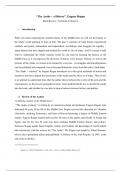EPSCI
Latest uploads at EPSCI. Looking for notes at EPSCI? We have lots of notes, study guides and revision notes available for your school.
-
8
- 0
-
2
Courses at EPSCI
Notes available for the following courses at EPSCI
-
Politics and Government 8
Latest content EPSCI

This presentation is a an in-depth analysis of the formation of modern Turkey. It looks into its building blocks: Tanzimat, Industrial Revolution, Pan-Islamism, Conservatism, Ottomanism and Young Turks. It also provides with general timeline, as well as synthesizes all waves of Turkish history,
- Presentation
- • 17 pages's •
-
EPSCI•History of the long 19th century
Preview 3 out of 17 pages
This presentation is a an in-depth analysis of the formation of modern Turkey. It looks into its building blocks: Tanzimat, Industrial Revolution, Pan-Islamism, Conservatism, Ottomanism and Young Turks. It also provides with general timeline, as well as synthesizes all waves of Turkish history,

This is an essay that looks into Tamanaha's work “Several meanings of Politics in judicial politics study: Why ideological influence is not partisanship?”, and provides supportive examples and arguments, as well as counteracts with his arguments.
- Package deal
- Essay
- • 6 pages's •
-
EPSCI•Law and Politics
-
Law and Politics• Byyy3195
Preview 2 out of 6 pages
This is an essay that looks into Tamanaha's work “Several meanings of Politics in judicial politics study: Why ideological influence is not partisanship?”, and provides supportive examples and arguments, as well as counteracts with his arguments.

It is a 10-slide presentation related to an essay (which can be found in Law and Politics Package) discussing the topic of "Several meanings of Politics in judicial Politics study: Why ideological influence is not partisanship?”. It provides major examples and counter-arguments for the topic of partisanship in judicial processes.
- Package deal
- Presentation
- • 10 pages's •
-
EPSCI•Law and Politics
-
Law and Politics• Byyy3195
Preview 2 out of 10 pages
It is a 10-slide presentation related to an essay (which can be found in Law and Politics Package) discussing the topic of "Several meanings of Politics in judicial Politics study: Why ideological influence is not partisanship?”. It provides major examples and counter-arguments for the topic of partisanship in judicial processes.

This essay tries to answer the question of "What led to the transformation of Mostar from a center of Balkan’s interreligious coexistence to Bosnia’s most divided city?". It argues that Mostar’s transformation was a result of ethnoreligious narratives that intensified the Balkan war, as well as deep-seated mistrust after the horrors of the War, and the city’s urban structure that to this day divides its religious communities.
- Essay
- • 8 pages's •
-
EPSCI•Humanities and Religions
Preview 2 out of 8 pages
This essay tries to answer the question of "What led to the transformation of Mostar from a center of Balkan’s interreligious coexistence to Bosnia’s most divided city?". It argues that Mostar’s transformation was a result of ethnoreligious narratives that intensified the Balkan war, as well as deep-seated mistrust after the horrors of the War, and the city’s urban structure that to this day divides its religious communities.

This is an extended review of Eugene Rogan's piece "The Arabs". It includes a book summary, overview, overview of the author, and personal analysis of his intentions, discussions, political comments, and use of characters.
- Book
- Other
- • 16 pages's •
-
EPSCI•Reading Seminar
-
The Arabs • Eugene Rogan• ISBN 9780465094219
Preview 3 out of 16 pages
This is an extended review of Eugene Rogan's piece "The Arabs". It includes a book summary, overview, overview of the author, and personal analysis of his intentions, discussions, political comments, and use of characters.

This is a finished essay for Political Science class, and it tries to answer the question of "How, when, and why do revolutions (or coups) occur or fail to occur?". The essay looks into 3 generations of revolutionary theory and argues for how they are no longer applicable in predicting a revolution. It provides with examples from Eastern Europe and the Middle East
- Essay
- • 6 pages's •
-
EPSCI•Introduction to Politics
Preview 2 out of 6 pages
This is a finished essay for Political Science class, and it tries to answer the question of "How, when, and why do revolutions (or coups) occur or fail to occur?". The essay looks into 3 generations of revolutionary theory and argues for how they are no longer applicable in predicting a revolution. It provides with examples from Eastern Europe and the Middle East

This document is 19 pages summary of all major concepts connected to the course of introduction to politics. This document provides theory, examples and scientists on topics of political economy, political inputs and outputs and more. It specifically takes interest in the examples found in the Middle East and the EU.
- Package deal
- Lecture notes
- • 19 pages's •
-
EPSCI•Introduction to Political Science
-
Introduction to Political Science• Byyy3195
Preview 5 out of 19 pages
This document is 19 pages summary of all major concepts connected to the course of introduction to politics. This document provides theory, examples and scientists on topics of political economy, political inputs and outputs and more. It specifically takes interest in the examples found in the Middle East and the EU.

The document includes extended notes on major topics surrounding the subject. Examples of topics are state formation, state actors, political organization, and Secularization in MENA. Plus, the document provides real-life examples and political scientists' opinions.
- Package deal
- Lecture notes
- • 18 pages's •
-
EPSCI•Introduction to Political Science
-
Introduction to Political Science• Byyy3195
Preview 3 out of 18 pages
The document includes extended notes on major topics surrounding the subject. Examples of topics are state formation, state actors, political organization, and Secularization in MENA. Plus, the document provides real-life examples and political scientists' opinions.
